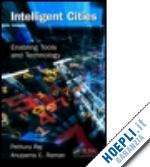Pethuru Raj PhD has been working as a cloud infrastructure architect in the IBM Global Cloud Center of Excellence, IBM India Bangalore. Previously he worked as TOGAF-certified enterprise architectureconsultant in Wipro Consulting Services Division, Bangalore. He also had a fruitful stint as a lead architect in the corporate research division of Robert Bosch, India. He has gained thirteen years of IT industry experience.Dr. Raj finished the CSIR-sponsored PhD degree in Anna University, Chennai, and continued the UGC-sponsored postdoctoral research in the department of Computer Science and Automation, Indian Institute of Science, Bangalore until 1999. Thereafter, he was granted a couple of international research fellowships (JSPS and JST) to work as a research scientist for three years in two leading Japanese universities. His technical competencies lie in service oriented architecture, cloud computing, enterprise architecture, context-aware computing and machine-to-machine integration, Big Data Analytics, Smart Cities, and business integration methods.He has contributed book chapters for a number of high-quality technology books edited by internationally acclaimed professors and professionals. The CRC Press, USA, released his first book titled Cloud Enterprise Architecture in 2012. He has edited a book on the title Cloud Infrastructures for Big Data Analytics. He maintains an Information Technology (IT) portal at www.peterindia.netAnupama Raman is currently working as Content Lead for Smart Cities Brand of IBM and she is a part of Software group, Industry Solutions of IBM India. Prior to this, she was working with EMC Data Storage. She is a certified Storage Area Networking expert and is also a certified Data Center Architect. She is also certified in Cloud infrastructure and Services Management. Apart from these technical certifications, in the field of writing. She is a certified Information mapping professional and in the field of project management, she is a certified Scrum master. She holds an M.Tech degree in Computer Science and Engineering and is currently pursuing an MBA in IT Management. She has presented and published over twenty research papers in various national and international conferences and she has also written numerous book chapters with various national and international publishers.











